 ABOUT YOU
ABOUT YOU
When did you first find out that you wanted to be scientist?
In high school, but I actually wanted to be a meteorologist as I was fascinated by
weather.
Tell us something about your background and main research interests
The topic of my PhD is “Water”. I know… this is a bit vague, but it was carried out at an interdisciplinary Department where this natural resource was in focus. My main research interests lies in biogeochemistry and microbial impacts on cycling of different elements. In doing so I have increasingly relied on molecular tools (environmental genomics) to understand the metabolic functioning and role of microbes in lakes, brackish and polar oceans, wetlands, deep terrestrial biomes and animal associated systems.
In plain words…what is the principal aim of your current investigation?
If you mean my engagement in SINGEK, this mainly concerns microbe-microbe interactions and development of technologies to study these functional linkages. Apart from that I currently work a lot on understanding mercury methylation and the the fate of microbial necromass (and some 10-20 other things).
What do you like doing in your free time?
The little time I have I spend with my family (cooking, traveling, doing sports, picking mushrooms or doing construction work on my summer house) but since this time is not enough I try to make sure I also get to do fun stuff as part of my job (mainly traveling and visiting cool places and people).
Which is the best advice you have ever received in science?
If it doesn’t make you excited-don’t do it.
ABOUT THE PROJECT
In non scientific words… What is your role in SINGEK project?
Me and my student try to develop better ways to break microbial cells and describe what they hold inside. I also help train other students and researchers how to work experimentally with single cells.
How do you think your work in SINGEK will contribute to the research field of Single Cell Genomics of microbial eukaryotes?
My vision is that we will provide a solid foundation for future single cell genomics experiments and in the meantime reveal some major new cool interactions between unicellular eukaryotes and bacteria/archaea.
In plain words…how do you think SINGEK will contribute to better understand the living world?
By training and bringing together 15 brilliant young scientists that will in due time revolutionize the biodiversity research field. The actual activities within the project will of course also reveal hitherto undescribed microeukaryote diversity and in essence open up for biological inquiry to be carried out at single cell level. This will enable us to go beyond population averages and address entirely new biological questions.
How do you recommend people to follow your research activity?
I tell them when we meet (and I meet a lot of people…). I am also somewhat active on twitter and part of different infrastructure operations. The latter is very efficient in getting the word out and reach beyond your existing network.

